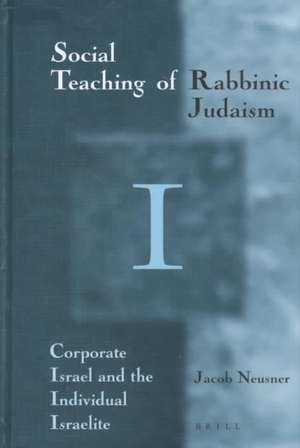The Social Teachings of Rabbinic Judaism (3 vols)
Autor Jacob Neusneren Limba Engleză Hardback – 20 iun 2001
Part 1: Corporate Israel and the Individual Israelite
In the first part of the project, on Corporate Israel and the Individual Israelite we ask where and how the Halakhah sorts out the relationships of the individual and the community: the realm of responsible action and particular responsibility assigned by the Halakhah to each. Prophecy, from Moses forward, and the Halakhah from the Mishnah onward, concur that the condition of "all Israel" dictates the standing of each individual within Israel, and further concur that each Israelite bears responsibility for what he or she as a matter of deliberation and intention chooses to do. If individuals were conceived as automatons, always subordinated agencies of the community, or if the community were contemplated as merely the sum total of individual participants, a particular social teaching would hardly demand attention.
But Scripture, continued in the Mishnah, Tosefta, the two Talmuds, and Midrash, insists that Israelites are individual responsible for what they do, and further that corporate Israel on its own, not only as the sum of individual actions, forms a moral entity subject to judgment. So these are the governing questions: How to sort out these intersecting matters, then, the obligations of the community, the responsibilities of individuals? How does the social teaching of Rabbinic Judaism hold together doctrines of individual obligations to Heaven and mutual responsibilities, on the one side, with all Israel¹s commitments and public convictions, on the other?
Part 2: Between Israelites
Part 2 turns to relationships between Israelites, with particular attention to those that require resolving conflict. Once the law recognizes not only Israelites but the integrity of corporate Israel, how does it regulate relationships within the framework of that corporate community? By regulating relationships the sages will have understood, relationships of competition, contention, and conflict. Those of collaboration, consensus, and cooperation require no regulation on the part of constitutive law; they regulate themselves by their nature: people keep rules. Then at issue are where the corporate community intervenes to protect its interests in relationships between and among individual Israelites, and how it does so.
The exposition then follows the laws presentation of those relationships as integral to the larger system of Rabbinic Judaism and its plan for its Israel's public life, hence, once more, the focus on large constructions, category-formations that are integral to the main beams of the Halakhic system and structure.
Part 3: God's Presence in Israel
Part 3 raises the third and final question of the social order: God's role in society. For Rabbinic Judaism to be "Israel" means to live in God's kingdom, under God's rule, in a very particular way. That imperative addresses not individuals alone or mainly but, rather, corporate Israel, that is, the entire social order. It encompasses not merely feelings or attitudes but registers in the here of tangible transactions and in the now of workaday engagements, not only in some distant time. The generative question of this third and concluding part of the study of the social teaching of Rabbinic Judaism, is this: What, precisely, does God's active presence mean in the system of the social order put forth by the Halakhah?
Preț: 1252.28 lei
Preț vechi: 1527.17 lei
-18% Nou
Puncte Express: 1878
Preț estimativ în valută:
239.65€ • 260.23$ • 201.31£
239.65€ • 260.23$ • 201.31£
Carte indisponibilă temporar
Doresc să fiu notificat când acest titlu va fi disponibil:
Se trimite...
Preluare comenzi: 021 569.72.76
Specificații
ISBN-13: 9789004122611
ISBN-10: 9004122613
Pagini: 256
Dimensiuni: 164 x 249 x 67 mm
Greutate: 1.86 kg
Editura: Brill
Colecția Brill
ISBN-10: 9004122613
Pagini: 256
Dimensiuni: 164 x 249 x 67 mm
Greutate: 1.86 kg
Editura: Brill
Colecția Brill
Notă biografică
Jacob Neusner, Ph.D., Columbia University, is Research Professor of Religion and Theology at Bard College, Annandale-on-Hudson, NY. He has published more than 800 books and is Editor of The Brill Reference Library of Judaism (Brill).
